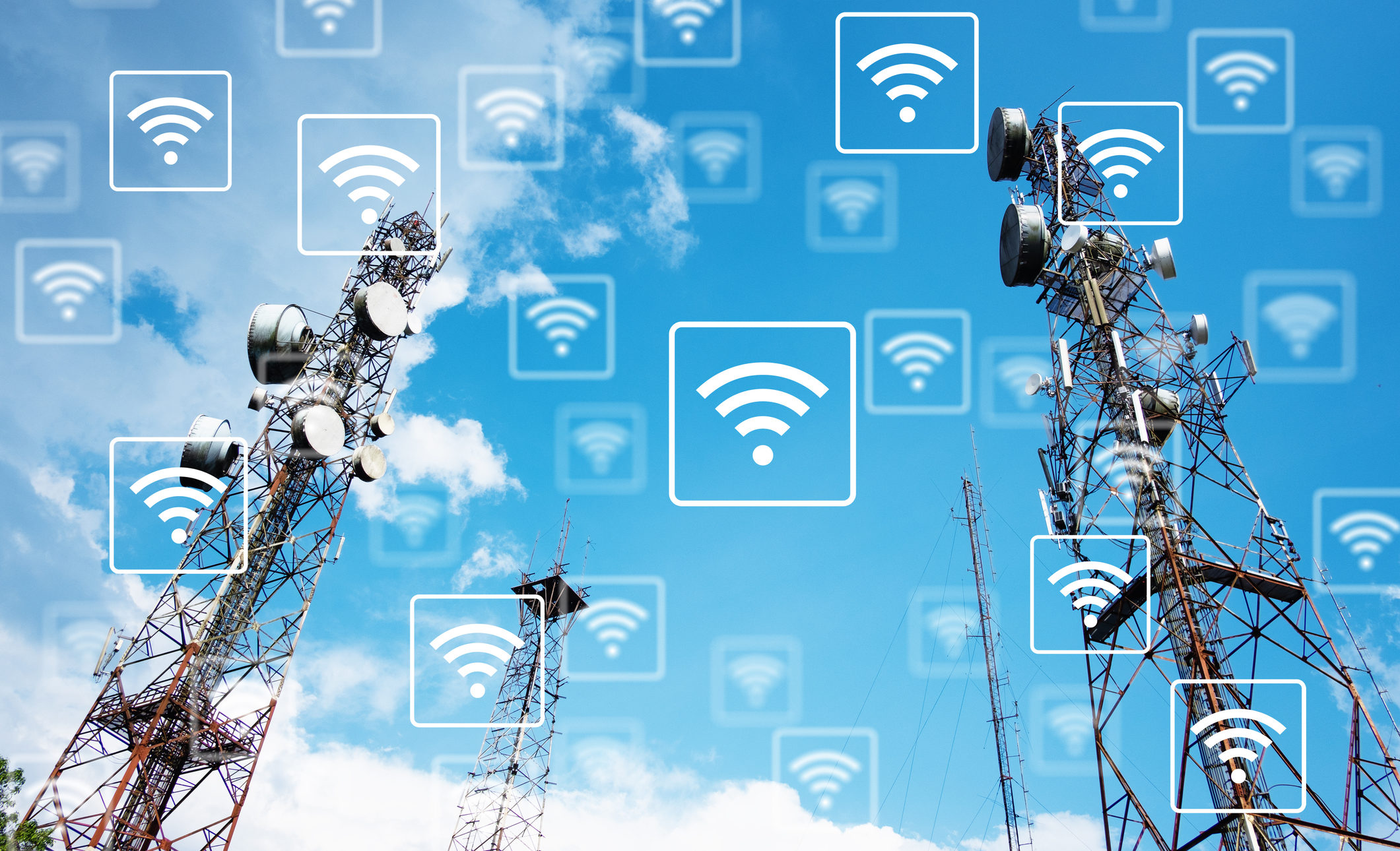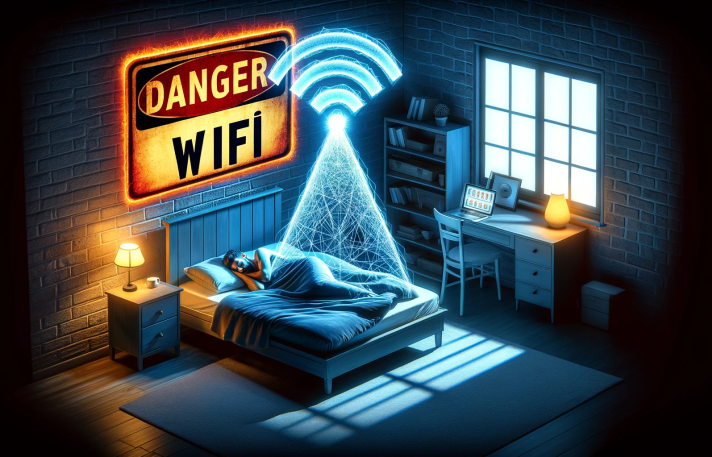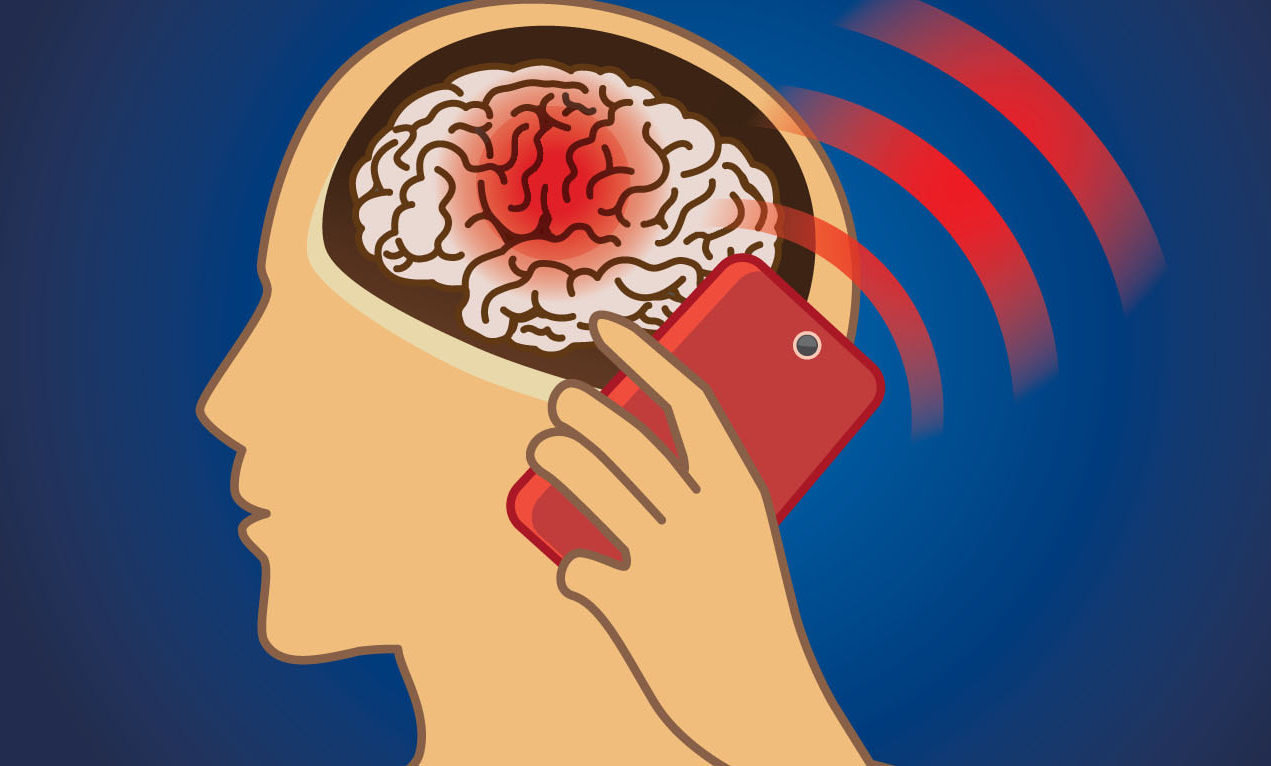Ten New Studies Detail Health Risks of 5G
Story at-a-glance
- Several studies published between 2022 and 2024 underscore the health risks posed by 5G technology
- Research contradicts the International Commission on Non-Ionizing Radiation Protection guidelines, demonstrating various harmful biological effects of radiofrequency radiation (RFR) on humans and the environment, including potential cancer risk
- Studies reveal 5G’s potential to induce neurological damage and psychiatric problems, highlighting its effects on brain development, including the increased risk of conditions like dementia
The video above features an interview I did with Siim Land in February 2020 for his podcast in which I discuss EMF — what it is, your greatest sources of exposure, how it affects your biology, and how to minimize your exposure. I also review how the telecommunications industry manipulates the truth to keep you unaware of the potential hazards.
While the wireless industry is built on the premise that the only type of radiation capable of causing harm is ionizing — X-rays being one example — researchers have for a long time warned that even nonionizing and non-heating radiation can jeopardize your health. This includes not only human health, but also that of plants and animals.
Over time, I became so convinced of the deleterious effects of EMF, I took three years to write EMF*D which was published in 2020. In it, I reviewed the overwhelming evidence showing EMFs are a hidden health hazard that simply cannot be ignored any longer.
During the pandemic, we also witnessed the rollout and installation of 5G across the country, which has exponentially increased exposures, as it’s added on top of the already existing wireless infrastructure.
The short video below, published by Investigative Europe in January 2019, gives a quick overview of how 5G differs from previous wireless technology. At the time, little if any research had been done on 5G specifically, but between 2022 and 2024, 10 new studies have been published that shed more light on this fifth-generation technology.
5G Appeals for Moratorium Ignored Despite Evidence
The first of these appeals, published in September 2022 in the journal Reviews on Environmental Health, provides a good overview of the hazards 5G poses. The authors pointed out that, since September 2017, over 400 scientists and doctors have collectively submitted six appeals to the European Union, calling for a moratorium on 5G technology. All have been ignored.
The September 2021 appeal included an “extensive cover letter” in which experts argued that the EU’s reliance on guidelines by the International Commission on Non-Ionizing Radiation Protection (ICNIRP) places public health at risk because the guidelines only consider “heating and no other health relevant biological effects from RFR.”
The letter countered the ICNIRP’s guidance with research from European and international expert groups detailing myriad adverse biological effects of RFR on humans and the environment. According to the authors:
“Evidence to establish this position is drawn from studies showing changes to neurotransmitters and receptors, damage to cells, proteins, DNA, sperm, the immune system, and human health, including cancer.
The 2021 Appeal goes on to warn that 5G signals are likely to additionally alter the behavior of oxygen and water molecules at the quantum level, unfold proteins, damage skin, and cause harm to insects, birds, frogs, plants and animals.”
Aggregation of Signals Pose Serious Concerns
Under the subhead Great Plans, Great Promises but False Claims, the authors go on to highlight the government’s own findings:
“……. the potential health and safety risks associated with RFR have been exposed in a recent EU-commissioned review of the currently available scientific evidence, the 2021 European Parliamentary Research Service’s EPRS/STOA Health impact of 5G report.
The conclusions of the comprehensive review declared sufficient evidence for cancer from RFR in animals, sufficient evidence for adverse effects from RFR on the fertility of men, male rats and mice, and that RFR is probably carcinogenic to humans.
In short, the EPRS/STOA report shows that RFR is harmful for health. The report subsequently calls for measures to incentivize the reduction of RF-EMF exposures (p. 153), such as lowering the limit for allowed exposures and the preferential use of wired connections.
Similarly, the EU’s own (ITRE committee) 2019 in-depth analysis, 5G Deployment: State of Play in Europe, USA and Asia warned that, when added to 2G, 3G, 4G, WiFi, WIMAX, DECT, radar etc., 5G will cumulatively lead to dramatically more total radiation: not only from the use of much higher frequencies in 5G but also from the potential for the aggregation of different signals, their dynamic nature, and the complex interference effects that may result, especially in dense urban areas (p 11).
These concerns are based on the complexity of communications signals and the unknowns of their interactions. Electromagnetic signals transmitted by manmade communication devices are not regular waves; rather, they are a complex combination of ultra-high frequency carrier waves, and modulations that encode the messages using extremely-low and ultra-low frequencies.
In addition, the signals are pulsed at ultra-low frequencies (sent in short on-off bursts). This means that although the RFR carrier waves may sit in the high frequency GHz range, their modulations and pulse rates are much closer to brain-wave frequencies; e.g., the 217 Hz pulsing of a GSM phone signal.
Pulsed or modulated RFR signals have been shown to be more bio-active than simple continuous waves of the same intensity and exposure duration. This is of significant concern in relation to public health and is not limited to just the higher 5G frequencies.
Furthermore, as the report noted, the effects of these new complex beam formed signals have unpredictable propagation patterns that could result in unacceptable levels of human exposure to electromagnetic radiation (p. 6) but are yet to be mapped reliably for real situations, outside the laboratory.”
5G May Cause Neurological and Psychiatric Problems
The second study, published in November 2022, investigated the effects of 4.9 GHz (one of several 5G frequencies) RFR on the emotional behaviors and spatial memory in adult male mice. The exposure was found to induce “depression-like behavior” caused by “neuronal pyroptosis in the amygdala.”
Pyroptosis is a form of programmed cell death distinct from other forms of apoptosis, characterized by its inflammatory response. It involves the swelling and bursting of the cell, leading to the release of pro-inflammatory cytokines and intracellular contents that can trigger an immune response in the surrounding tissue.
This process is controlled by gasdermin proteins, which form pores in the cell membrane, and is often initiated in response to infections by pathogens or other signals indicating cellular damage.
5G induces cell death in the amygdala, a region of the brain involved in emotion regulation, memory, and decision-making.
The amygdala is a region of the brain involved in emotion regulation, memory, and decision-making. So, pyroptosis in this area could be indicative of neurological damage or inflammation, potentially affecting emotional regulation, behavior, and cognitive functions.
This could be relevant in the context of neurodegenerative diseases, brain injuries, or infections that impact the central nervous system, leading to various neurological and psychiatric implications.

Four Studies Confirm 5G’s Impact on Neurology
Another four studies published in 2023 also show a variety of damage occurring in the brain:
- 5G increases permeability of the blood-brain barrier — In the first, RFR from 5G cellphones at 3.5 GHz or 4.9 GHz for one hour per day for 35 days straight was found to increase the permeability of the BBB in the cerebral cortex of mice.
- RFR impairs neurogenesis and causes neuronal DNA damage — In the second, continuous RFR from cellphones at 2115 MHz for eight hours was shown to induce higher levels of lipid peroxidation, carbon-centered lipid radicals, and single-strand DNA damage, resulting in impaired neurogenesis in the hippocampal region and neuronal degeneration in the dentate gyrus region.
Translation: Cellphone radiation may cause cognitive impairment and deficits, behavioral changes and dysfunctional mood regulation, neurodegenerative disorders (due to the oxidative stress within neurons) and psychiatric conditions such as anxiety and depression.
- Electromagnetic radiation associated with anxiety — This study found anxiety-like behavior in male mice exposed electromagnetic radiation at 2650 MHz for four hours a day for 28 days.
- 5G may promote dementia — Lastly, a follow-up study on previous research concluded that RFRs at 1.8 GHz to 3.5 GHz:
◦ Inhibit neurosin, an enzyme that plays a role in brain health, including the breakdown of proteins that, if not properly managed, could lead to conditions like Alzheimer’s disease. This finding suggests that cellphone radiation could potentially interfere with the brain’s ability to prevent the buildup of harmful proteins.
◦ Inhibit the electrical activity of neurons in vitro — Neurons communicate with each other using electrical signals and this activity is crucial for everything your brain does, from processing sensory information to controlling muscle movements. Inhibiting electrical activity means disrupting normal brain cell communication, which could potentially impact brain functions.
5G Affects Brain Development
An October 2023 study by Bodin et al. investigated the effects of exposure to 5G during the perinatal period — around the time of birth — on the neurodevelopment of rats. The main goal of this study was to explore how being exposed to 5G EMF around the time of birth affects the brain development of rats as they grow into juveniles and adolescents.
Both male and female rat pups exposed to 5G EMF showed delayed incisor (front teeth) eruption. This indicates that EMF exposure could potentially slow down certain aspects of physical development. The study also found notable differences in behavior based on the sex of the rats.
In adolescent female rats, there was a significant reduction (70%) in stereotyped movements, such as repetitive patterns of behavior, in the open field test. This suggests that exposure may reduce certain repetitive behaviors in females. In contrast, male rats exhibited a 50% increase in stereotyped movements, indicating that the same exposure led to an increase in repetitive behaviors.
In short, the research suggests that exposure to 5G EMF at levels below the regulatory threshold during a critical period of development (perinatal period) has the potential to cause disturbances in neurodevelopment. These effects are seen in juvenile and adolescent descendants and manifest differently in males and females.
While it’s difficult to predict what the human health implications of this might be, it’s worth noting that repetitive behaviors are often associated with neurodevelopmental disorders such as autism spectrum disorder (ASD) and attention deficit hyperactivity disorder (ADHD). In such cases, these behaviors may signal underlying neurological differences and can impact a person’s social interactions, learning, and daily functioning.
In some instances, repetitive behaviors can also be symptomatic of anxiety, obsessive-compulsive disorder (OCD), stress-related disorders and self-harming behaviors such as skin picking or hair pulling. For some persons, repetitive behaviors can interfere with attention and focus, affecting academic performance, workplace productivity, and the ability to complete daily tasks efficiently.
It can also affect a person’s social interactions and relationships, and can lead to social isolation, bullying, or stigma, particularly in children and adolescents, further impacting emotional well-being and self-esteem. Repetitive behaviors, particularly those associated with anxiety or compulsive disorders, can also disrupt sleep patterns, leading to insomnia or poor sleep quality, which in turn affects overall health and well-being.

RFR Decimates Male Fertility — Melatonin Can Help Restore It
A December 2023 study, which explored the negative effects of long-term exposure to 2100 MHz RFR on rat sperm characteristics, brought both good and bad news.
On the downside, male rats exposed to RFR at 2100 MHz for 30 minutes a day had a significantly higher percentage of sperm with abnormal shapes. There was also a significant reduction in the total sperm count among the exposed rats.
At a more detailed level, examining the sperm structure under a microscope (the ultrastructural level), damage was observed in critical parts of the sperm, including the:
- Acrosome, a cap-like structure that helps the sperm penetrate an egg
- Axoneme, the central shaft of the sperm tail
- Mitochondrial sheath, which powers the sperm tail’s movement
- Outer dense fibers, which are part of the sperm tail
The good news is that melatonin supplementation was able to prevent these problems. Rats given 10 milligrams of melatonin per kilo of bodyweight via subcutaneous administration had increased sperm counts and the proportion of sperms with normal shapes increased. Moreover, the ultrastructural damage to sperm caused by RF exposure was fully reversed. As reported by the authors:
“The percentages of abnormal sperm morphology were significantly increased with RF exposure, while the total sperm count was significantly decreased ……. The number of total sperms, sperms with normal morphology increased, and ultrastructural appearance returned to normal by melatonin administration.”
Case Study of 8-Year-Old Boy
In January 2024, Hardell et al. presented a case study of an eight-year-old boy experiencing severe headaches and other symptoms while attending a school located near a mobile phone tower equipped with 5G base stations.
The boy’s school is situated 200 meters away from a mobile phone tower with 5G base stations, with his classroom being 285 meters away. Soon after starting school, he began experiencing headaches, which were initially sporadic, not occurring every day or every week.
By autumn 2023, the boy’s headaches intensified, occurring daily and rated as a 10 on a 10-grade scale, where 0 signifies no discomfort and 10 indicates unbearable pain. He also experienced fatigue (rated 5) and occasional dizziness (rated 7), specifically while at school. At home, he occasionally had mild headaches (rated 2) that subsided relatively quickly.
In the autumn of 2023, he started wearing an RF-protective cap and outerwear at school, both indoors and outside, after which the headaches vanished.
This paper also cites epidemiological studies and laboratory research linking RF radiation exposure to cancer through mechanisms such as oxidative stress, mRNA effects and DNA damage, and argues for classifying RF radiation as a Group 1 human carcinogen, noting that “This classification should have a major impact on prevention measures.”
5G Alters Your Microbiome
Lastly, a February 2024 study by Wang et al. examined the impact of 5G RFR on the fecal microbiome and metabolome profiles in mice. The results indicated that the mice exposed to RFR experienced significant alterations in their intestinal microbial compositions, characterized by a decrease in microbial diversity and shifts in the microbial community distribution.
Through metabolomics profiling, the researchers identified 258 metabolites that were significantly differentially abundant in the mice exposed to RF fields compared to controls, which suggests it can have a profound impact on metabolic processes.
The authors concluded that exposure to 4.9 GHz RFR can cause intestinal microbiota dysbiosis in mice and hypothesized that the observed imbalances in gut microbiota and metabolism might be linked to depression-like behaviors in mice seen in so many studies. The imbalance in the metabolic profile may also be associated with changes in immune regulation or inflammation.
5G Will Harm Every Living Being
In September 2019, the Minister for Communications, Hon. Paul Fletcher MP asked the Committee to complete and inquiry into the “deployment, adoption and application of 5G in Australia.” In response, Paul Barratt, on behalf of ElectricSense, submitted a document, stating, in part:
“5G is dangerous and will harm every living being. Thousands of studies link low-level wireless radio frequency radiation exposures to a long list of adverse biological effects, including:
- DNA single and double strand breaks
- oxidative damage
- disruption of cell metabolism
- increased blood brain barrier permeability
- melatonin reduction
- disruption to brain glucose metabolism
- generation of stress proteins
Let’s not also forget that in 2011 the World Health Organization (WHO) classified radio frequency radiation as a possible 2B carcinogen. More recently the $25 million National Toxicology Program concluded that radio frequency radiation of the type currently used by cell phones can cause cancer.
But where does 5G fit into all this? Given that 5G is set to utilize frequencies above and below existing frequency bands 5G sits in the middle of all this. But the tendency (it varies from country to country) is for 5G to utilize the higher frequency bands. Which brings its own particular concerns.”

Barratt goes on to list “11 reasons to be concerned about 5G radiation,” including:
- Denser electrosmog
- Skin diseases and pain, as “analyses of penetration depth show that more than 90% of the transmitted power is absorbed in the epidermis and dermis layer”
- Eye damage
- Effects on the heart, including impacts on heart rate variability and arrhythmias
- Reduced immune function
- Depressed cell growth rates and alterations in cell properties and cell activity
- Increased risk of antibiotic-resistant pathogens
- Necrosis in plants, and the possibility that plant foods may become unsuitable for human consumption
- Atmospheric effects and fossil fuel depletion
- Eco system disruptions
- Misleading 5G study results, as most do not pulse the waves. As noted by Barratt, “This is important because research on microwaves already tells us how pulsed waves have more profound biological effects on our body compared to non-pulsed waves. Previous studies, for instance, show how pulse rates of the frequencies led to gene toxicity and DNA strand breaks.”
Protect Yourself and Your Family From Excessive EMF
There’s no doubt that RF-EMF exposure is a significant hazard that needs to be addressed if you’re concerned about your health. The rollout of 5G certainly makes remedial action more difficult, but the added hazards are all the more reason to get involved and do what we can to minimize exposure.
Identify major sources of EMF, such as your cellphone, cordless phones, Wi-Fi routers, Bluetooth headsets and other Bluetooth-equipped items, wireless mice, keyboards, smart thermostats, baby monitors, smart meters and the microwave in your kitchen. Ideally, address each source and determine how you can best limit their use.
Barring a life-threatening emergency, children should not use a cellphone or a wireless device of any type. Children are far more vulnerable to cellphone radiation than adults due to having thinner skull bones.
Research also demonstrates that infants under the age of 1 do not effectively learn language from videos, and do not transfer what they learn from the iPad to the real world, so it’s a mistake to think electronic devices provide valuable education.
Connect your desktop computer to the internet via a wired Ethernet connection and be sure to put your desktop in airplane mode. Also avoid wireless keyboards, trackballs, mice, game systems, printers and portable house phones. Opt for the wired versions.
If you need to use Wi-Fi, shut it off when not in use, especially at night when you’re sleeping. Ideally, work toward hardwiring your house so you can eliminate Wi-Fi altogether. If you have a notebook without any Ethernet ports, a USB Ethernet adapter will allow you to connect to the internet with a wired connection.
Avoid using wireless chargers for your cellphone, as they too will increase EMFs throughout your home. Wireless charging is also far less energy efficient than using a dongle attached to a power plug, as it draws continuous power (and emits EMF) whether you’re using it or not.
Shut off the electricity to your bedroom at night. This typically works to reduce electrical fields from the wires in your wall unless there is an adjoining room next to your bedroom. If that is the case, you will need to use a meter to determine if you also need to turn off power in the adjacent room.
Use a battery-powered alarm clock, ideally one without any light.
If you still use a microwave oven, consider replacing it with a steam convection oven, which will heat your food as quickly and far more safely.
Avoid using “smart” appliances and thermostats that depend on wireless signaling. This would include all new “smart” TVs. They are called smart because they emit a Wi-Fi signal and, unlike your computer, you cannot shut the Wi-Fi signal off. Consider using a large computer monitor as your TV instead, as they don’t emit Wi-Fi.
Refuse a smart meter on your home as long as you can, or add a shield to an existing smart meter, some of which have been shown to reduce radiation by 98% to 99%.
Consider moving your baby’s bed into your room instead of using a wireless baby monitor. Alternatively, use a hard-wired monitor.
Replace CFL bulbs with incandescent bulbs. Ideally remove all fluorescent lights from your house. Not only do they emit unhealthy light, but more importantly, they will actually transfer current to your body just being close to the bulbs.
Avoid carrying your cellphone on your body unless in airplane mode and never sleep with it in your bedroom unless it is in airplane mode. Even in airplane mode it can emit signals, which is why I put my phone in a Faraday bag.

When using your cellphone, use the speaker phone and hold the phone at least 3 feet away from you. Seek to radically decrease your time on the cellphone. Instead, use VoIP software phones that you can use while connected to the internet via a wired connection.
Avoid using your cellphone and other electronic devices at least an hour (preferably several) before bed, as the blue light from the screen and EMFs both inhibit melatonin production.
Research clearly shows that heavy computer and cellphone users are more prone to insomnia. For example, one 2008 study revealed that people exposed to radiation from their mobile phones for three hours before bedtime had more trouble falling asleep and staying in a deep sleep.
The effects of EMFs are reduced by calcium-channel blockers, so make sure you’re getting enough magnesium. Most people are deficient in magnesium, which will worsen the impact of EMFs. As previously noted by EMF expert Dr. Martin Pall:
“When you’re deficient in magnesium, you get excessive activity of the VGCCs. You also get excessive calcium influx through the N-methyl-D-aspartate receptor, caused by magnesium deficiency, which is also problematic, so it’s important to allay that deficiency.”
Pall has also published a paper suggesting that raising your level of Nrf2 may help ameliorate EMF damage. One simple way to activate Nrf2 is to consume Nrf2-boosting food compounds. Examples include sulforaphane-containing cruciferous vegetables, foods high in phenolic antioxidants, carotenoids (especially lycopene), sulfur compounds from allum vegetables, isothiocyanates from the cabbage group, and terpenoid-rich foods.
Molecular hydrogen has been shown to target free radicals produced in response to radiation, such as peroxynitrites. Studies have shown molecular hydrogen can mitigate about 80% of this damage.
Molecular hydrogen will also activate Nrf2, a biological hormetic that upregulates superoxide dismutase, catalase and all the other beneficial intercellular antioxidants. This in turn lowers inflammation, improves your mitochondrial function and stimulates mitochondrial biogenesis.
Author: Dr. Joseph Mercola
yogaesoteric
June 7, 2024
